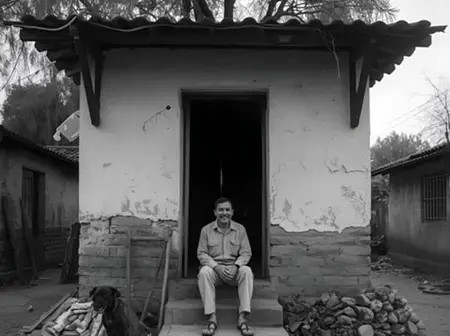A retired headteacher, a man who once stood tall before blackboards and classrooms full of eager children. He had a calling, not just to educate but to build. First his students, then his own children. For decades, his life was a disciplined routine: waking early, working late, and always carrying the silent burden of fatherhood. His life resembled an assembly line — predictable, unglamorous, but necessary.
He worked tirelessly to raise his children, pouring everything — his time, dreams, and paychecks — into their future. His own strategic goals were shelved in favor of school fees: expensive high schools, even more expensive universities. His sacrifice bore fruit. The children now flourish in high-paying jobs across Europe, Australia, and America. They are successful — by society’s metrics, at least.
And yet, he is alone.
At 55, his wife has relocated — funded by the very children he raised — to live with them abroad. First in Australia, then Europe, and now America. She will be gone for five years, moving from child to child, enjoying the fruits of a collective labor that largely rested on one man’s shoulders. She is in her season of reward.
But he remains in the village. Alone.
His phone rarely rings. When it does, it’s often a brief, distracted conversation — “Hi Dad, just checking in.” Calls that come not from deep concern, but out of routine guilt. There are no more packed lunches to make, no children to drop off, no staff meetings to attend. There is only silence, and the hum of memory.
He now begins life all over again as a single man in a village filled with shadows of his past. His companions? Hypertension and Diabetes. Chronic ailments that whisper the cost of decades of unacknowledged stress.
He travels frequently to the city to check on his pension, which is stuck in the bureaucratic maze of the National Social Security Fund. Each journey is both hope and humiliation — waiting in endless lines, trying to prove that he once mattered.
This is the quiet reality of many working-class men in monogamous marriages. The marriage contract that began with love, vows, and shared dreams seems to culminate in a lonely old age — full of sacrifice, but short on companionship.
In the prime of his life, he was the provider, the protector, the planner. But as he ages, society — and sometimes even family — slowly erases his value.
No matter how good a man is, the older he becomes, the less attention he receives. Not because he failed, but because he succeeded in making others independent — and forgot to build a soft landing for himself. And so, we are left to ask a difficult question:
Men sacrifice youth, energy, and personal dreams in exchange for stability — not for themselves, but for others. They compromise constantly: financially, emotionally, spiritually. They are often the invisible scaffolding upon which the family structure is built. Yet, when the building is complete, the scaffolding is dismantled.
In contrast, the woman — especially in traditional setups — often gains emotional support, financial access, and the social privilege of motherhood. In old age, she is pulled close, comforted, and kept warm by the very people the man once carried.
This is not an argument against marriage. It is a call to rethink how society treats the silent labor of men within it.
We must challenge the belief that male sacrifice is infinite and expected. We must make room for emotional acknowledgment, not just financial appreciation. We must build systems that support men emotionally in their sunset years, not just during their productive prime.
Because when the assembly line stops, the man doesn’t vanish. He remains — a quiet figure waiting for a phone call, a visit, a sign that his life’s work meant more than just success for others.
Marriage, in its current form, often programs men to give — until there is nothing left. Maybe it’s time we reprogrammed it — with fairness, dignity, and balance.

Leave a Reply